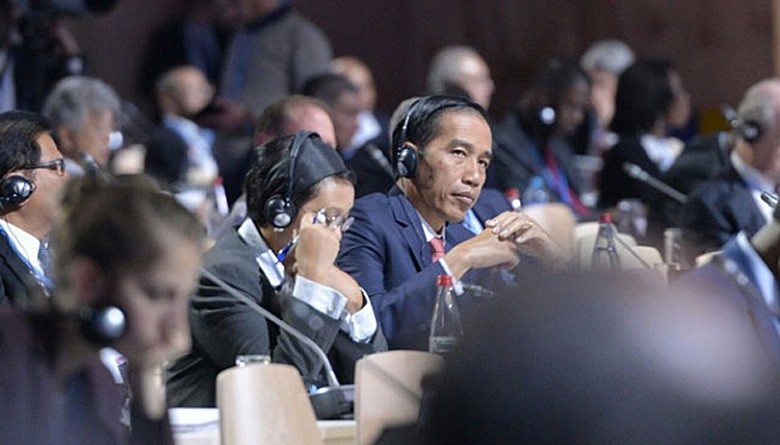RI prepares carbon-trading rule ahead of COP26
In the anticipation that the COP26 parties could finally agree on several issues left in the rulebook, Indonesia was preparing its own carbon-trading regulation, Laksmi said.
Change text size
Gift Premium Articles
to Anyone

I
ndonesia is preparing its own carbon-trading regulation ahead of the 26th United Nations Climate Change Conference (COP26) in Glasgow, Scotland, next week as it prioritizes, among other issues, pushing for the completion of international rules to govern carbon-emissions trading in the summit.
Parties to the Paris Agreement have been unable to agree on detailed provisions on carbon-emissions trading and other forms of international cooperation under Article 6 of the agreement, which is one of the articles left unresolved in the 2018 Paris rulebook – a guiding document to implement the agreement.
The Environment and Forestry Ministry’s climate change management director general Laksmi Dewanthi said that finishing the Paris rulebook, including resolving issues related to the implementation of Article 6, was one of the top priorities for Indonesian delegates at the climate conference.
In the anticipation that the COP26 parties could finally agree on several issues left in the rulebook, Indonesia was preparing its own carbon-trading regulation, Laksmi said.
“Currently, Indonesia is completing a draft of a Presidential Regulation on carbon economic value, which will regulate issues such as carbon trading [mechanisms], carbon offset and results-based payment [from carbon-emission reduction],” said Laksmi in an online discussion on Wednesday.
The regulation has been drafted since last year after it was initially announced that Indonesia had received US$56 million from Norway as part of the $1 billion grant promised under the REDD+ cooperation scheme. The scheme, however, was unilaterally terminated by the Indonesian government last month as it claimed to have never received the promised grant.
Read also: Indonesia, Norway in blame game over collapsed deforestation pact
Coordinating Economics Ministry undersecretary of agribusiness, pharmacy and tourism Dida Gardera separately said the government hoped to get the regulation passed before COP26.
Laksmi also said that Indonesia would aim to build an international consensus on climate financing, particularly after 2025, in the Glasgow summit.
At COP15 in Copenhagen, Denmark, in 2009, developed countries pledged to collectively mobilize US$100 billion per year by 2020 for climate action in developing countries. The goal was later extended to 2025 at COP21 in Paris in 2015.
According to the Organization for Economic Cooperation and Development's (OECD) latest estimate, developed countries channeled around $80 billion in 2019, up by 2 percent from 2018.
Foreign Ministry director for development, economy and environment Hari Prabowo said the government was hopeful that it would go to Glasgow in a “positive spirit” as Indonesia’s updated Nationally Determined Contribution (NDC) and Long-Term Strategy (LTS) documents had shown the country’s “ambition” was in line with its plan to implement carbon-emission reduction policies.
He also emphasized that Indonesia “wanted to be part of a solution” as it looks to build consensus with other countries to address the global challenge.
In Indonesia’s updated NDC, which has been submitted to the UN Framework Convention on Climate Change (UNFCCC) secretariat, the country aims to reduce its carbon emissions by 29 percent independently and by 41 percent with international assistance by 2030.
Read also: Indonesia expected to play leading role in climate summit: EU envoy
Meanwhile, Institute for Essential Service Reform executive director Fabby Tumiwa said that Indonesia’s updated NDC was quite ambitious and the country needed to roll out more emission-cutting policies, particularly in its energy sector.
That is because based on prevailing trends, emissions from the energy sector will surpass those from the forestry sector by 2025 and by 2030, when the forestry sector is expected to become a carbon sink, emissions from the energy sector will be the main contributor of emissions in Indonesia.
“We need great efforts especially in the energy sector to reduce emissions to be compatible with the Paris Agreement goal,” Fabby said, referring to the agreement’s primary goal of limiting global warming to around 1.5 degrees Celsius.
He said that more investments were needed for the energy sector in Indonesia to finance its transition into green energy and called for Indonesia to demand the fulfilment of the developed countries’ climate-financing pledges.
“I think this is what our negotiators will need to insist on. We would like to deliver greater [climate] ambitions but they [developed countries] need to fulfil their end of the bargain [by providing climate financing],” Fabby said.









